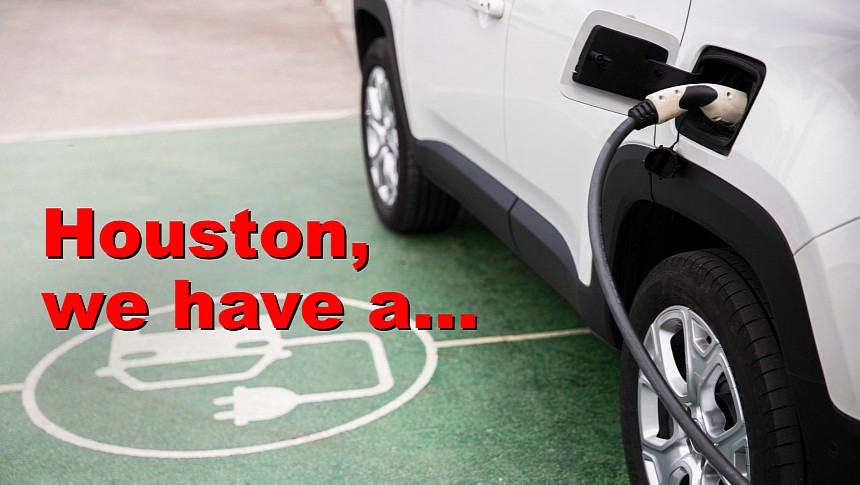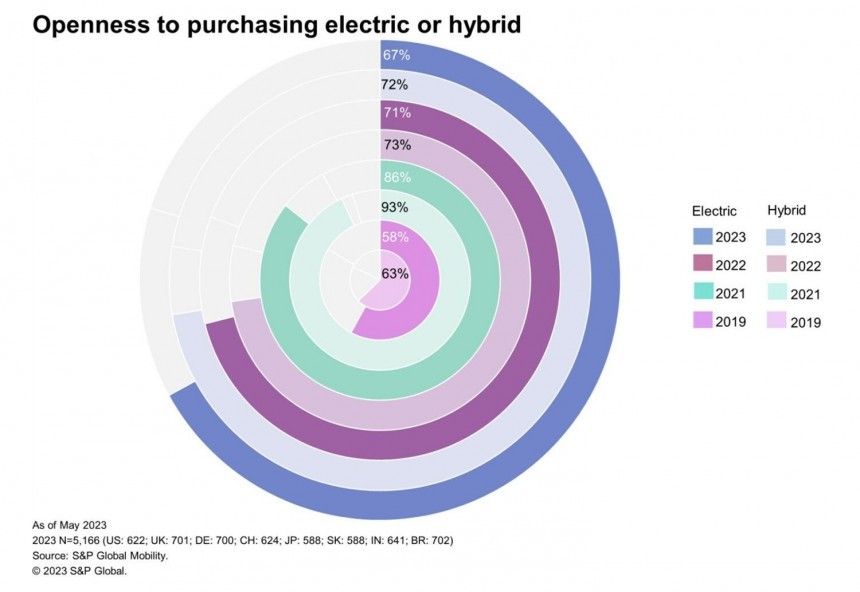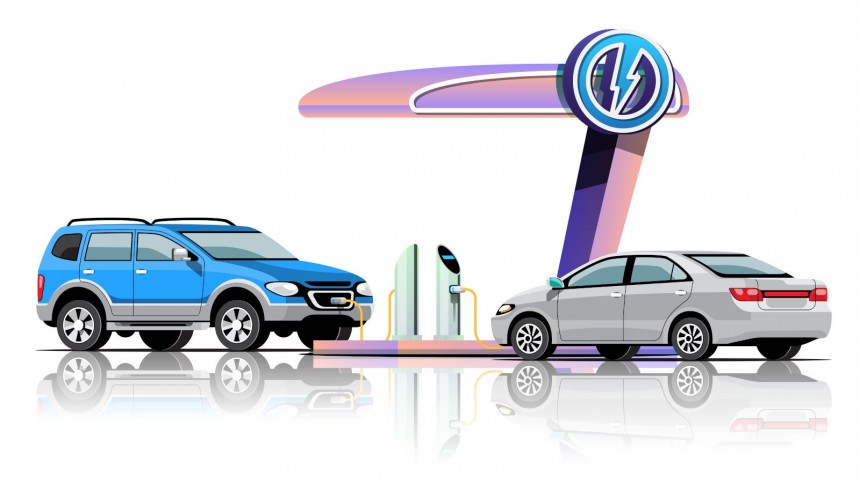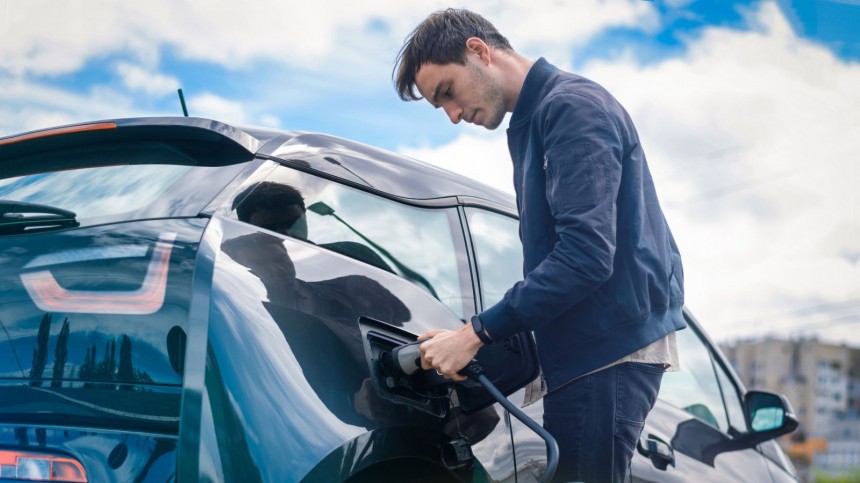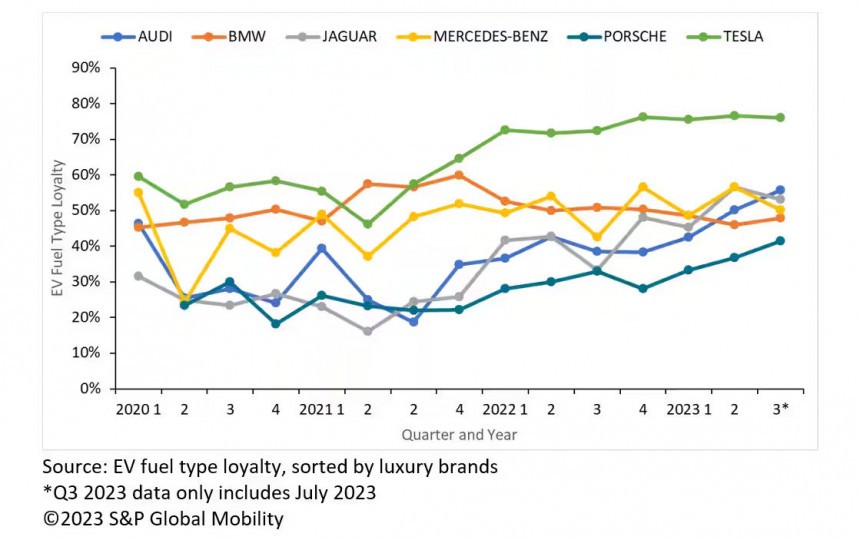Tesla missed its Q3 earnings estimate; Volkswagen, Ford, and GM cut EV production; Ford and LG drop plans for one of Europe's largest battery plants. Overall, the industry's stance is primarily pessimistic about the pace of EV adoption in Europe or the US. And things get even worse.
Do you remember the good ol' times from a couple of years back, when every industry expert talked about the "S-curve" of EV sales, and naysayers were all accused of "petrolhead propagandism" and "Big Oil partisanism"?
This wave of enthusiasm put pressure on carmakers to forecast a too-optimistic EV adoption rate despite the Covid-19 economic turmoil. Then, problems persisted because of the energy and inflation crisis partly caused by Russia's infamous war on Ukraine.
However, studies show the root of the problem is the same: EVs are perceived as being too expensive, having too short ranges, and depending on a scarce charging infrastructure.
Popular wisdom still beats math
The most recent S&P Global Mobility survey of 7,500 respondents globally concluded, "Pricing is still very much the biggest barrier to electric vehicles." Almost half of respondents (48%) were mainly concerned about the impact of EV prices on their wallets.
This is even though, according to S&P Global Mobility, "battery-electric vehicles are getting closer to price parity with their internal combustion siblings." Well, "price parity" is accurate only when considering all the costs involved, not solely the price tag – which, unfortunately, is still the only one that matters to people.
Add the other two well-known headaches of the "holy Trinity" of EV reluctance: range anxiety and the scarce charging network. Because of slow improvements in these fields, the number of those considering an EV for their next vehicle purchase dropped to 42% in 2023 from 86% in 2021.
In short, the number of prospective EV buyers simply halved in two years! No wonder the industry's forecast was too optimistic. Moreover, today, almost two-thirds of the respondents are willing to wait two or three years until battery technology improves. How about that stock pile-up dealers complain about?
Range anxiety still an issue
This summer, Shell released its sixth "Shell Recharge EV Driver Survey" report, aimed at how EV drivers' attitudes and behaviors change over time. The company suggests that range confidence has increased due to EV adoption acceleration: only 14% of respondents said they refrain from taking long journeys because of range anxiety.
The caveat is that this research project only aims at nearly 25,000 drivers in a few European countries where the EV market is pretty mature now: Germany, the Netherlands, France, Belgium, Italy, and the UK. So, the results are almost useless for the rest of Europe and even the US.
A recent study from researchers at George Washington University, "Quantifying Electric Vehicle Mileage in the United States," published in Joule journal in October, concluded that EVs travel far fewer miles than gas vehicles. How did they come to this conclusion?
They simply examined more than 20 million cars and SUVs odometer data between 2016 and 2022. On average, battery electric vehicles travel 4,500 fewer miles than gas cars. For small passenger cars, the difference is more significant (7,165 miles for EVs, compared to 11,642 miles for gas-powered cars), while for SUVs, it's smaller (10,587 miles for electric SUVs, compared to 12,945 miles for gas-powered SUVs).
The main conclusion of this study is aimed at policymakers: emissions savings from EVs are overestimated. Indeed, an EV is far less polluting than its ICEV counterpart when driving the same number of miles. But if the EV is driven less, the gain in CO2 emissions savings over its lifetime is considered only marginal.
Even Tesla owners, who drive more than other EV owners, drive less than conventional gas cars on average. Only hybrids and plug-in hybrids are on par with conventional gas cars regarding miles traveled, which is evident because of the lack of range anxiety issues.
Researchers suggest that EVs travel less because of the lack of charging infrastructure. Combined with a poor range, this is a critical factor that limits EV owners' ability to take longer-distance trips.
Of course, driving a car LESS, whether gas-powered or electric, means LESS pollution. However, researchers emphasize that because of higher upfront emissions for battery manufacturing, it will take longer for an EV to compensate for those emissions if people drive less.
But wait, there's more bad news coming from JD Power this time. Surprisingly, the overall satisfaction of ICEV owners is higher than EV owners!
A little confusion about the degree of satisfaction
The most recent JD Power 2023 US Sales Satisfaction Index (SSI) Study, released in November, saw an increase in overall customer satisfaction with the vehicle purchase experience to 793, from 786 in 2022. Unfortunately, this is not good news for electroheads like me because of the differences between EV and ICEV owners.
Namely, the index for owners of mass-market ICEVs is 848, while that of mass-market EVs is 790 –58 points less. Among premium owners, the difference is more minor, 35 points: 866 for ICEVs versus 831 for EVs. So, the hasty conclusion is that EV owners are not too content with their electric cars, right?
Well,… wrong. This index measures "satisfaction with the sales experience among new-vehicle buyers and rejecters (those who shop a dealership and purchase elsewhere)." So, it's not about using the vehicles but expressing feelings about dealerships and salespersons.
This is where we should keep an eye on because some key findings of this study reveal that dealers' reluctance on not-so-lucrative electric vehicles is still high. For instance, 11% of EV buyers need more information on charging their vehicles at home or in public chargers.
Also, they rate the expertise of salespersons at only 7.81, compared to 8.75 for ICEV buyers – which is a harsh indication of how interested dealers are in actually selling electric vehicles. This is mirrored by another percentage: more than one-third of EV buyers said dealers lack essential information on maintenance requirements.
I'll refrain from commenting on this subject, as it negatively impacts popular wisdom regarding EV adoption. Instead, I'll open a little Pandora's box regarding EV owners' loyalty.
Do we have an EV loyalty problem?
In October, S&P Global Mobility released a controversial study, a big bullet for EV naysayers. Its main conclusion is that "3 out of 4 Luxury EV Households Stick with EVs for Next Vehicle." Also, overall loyalty for EVs constantly increased in the last three years.
However, the problem is Tesla's dominance distorts the bigger picture. If we exclude Tesla owners – who are the fiercest fans of Elon's brand, much like Apple fanboys – it turns out that nearly half of EV owners go back to an ICE vehicle or a hybrid one (which obviously has an internal combustion engine).
Well, the last statement is not entirely true, as the ICEV might not replace the EV previously purchased, as it can be a second or third car in the household, or it may replace an older ICEV. At this point, I think it's time for an AI-driven study to correctly "translate" users' behavior.
But, for now, the data from the first half of the year in the US market shows us that, on average, only 52.1% of households stay loyal to electric vehicles. The best percentages come from Nissan (63.2%) and Chevrolet (60.6%).
For instance, 12.4% of Nissan Leaf households chose another Leaf, 14.3% chose a Tesla Model Y, and the rest went for Nissan's SUVs. Almost one-third of Chevrolet Bolt households went for a new Bolt, but the rest migrated to Chevrolet SUVs and trucks.
So, we can conclude that buyers were more interested in the type of vehicles – most of them went for more spacious and bigger range SUVs. There are more such offerings in the premium segment – starting with the best-selling Tesla Model Y – and EV loyalty is above 70%. However, the average is simply pulled up by Tesla because the rest of the luxury brands struggle somewhere at around 50% or less.
You could say these are the perils of transitioning to an electric era: the car industry must invest a lot in developing new and more affordable electric vehicles, and they have to accept the high risk of EV owners going back to ICEVs if those electric vehicles don't meet their high demands.
Don't worry, EVs are here to stay
So, let me ask that question one more time: should we really worry about the future of clean transportation? If your news feed is full of info like those I discussed in this article, you're probably more inclined to believe EV naysayers.
On the other hand, the dizzying level reached by investments in electromobility makes any reluctance to transition to a clean transportation environment futile. We should also recognize the reality of the harsh economic and socio-political global environment, which by all means has a massive impact on any investments and forecasts.
In the end, remember there's an info war out there, and this is inherent in a transition phase that will ultimately result in the very probable disappearance of an entire part of the global industry: internal combustion engines and oil-based fuels. I'm sure they won't go without a fight.
